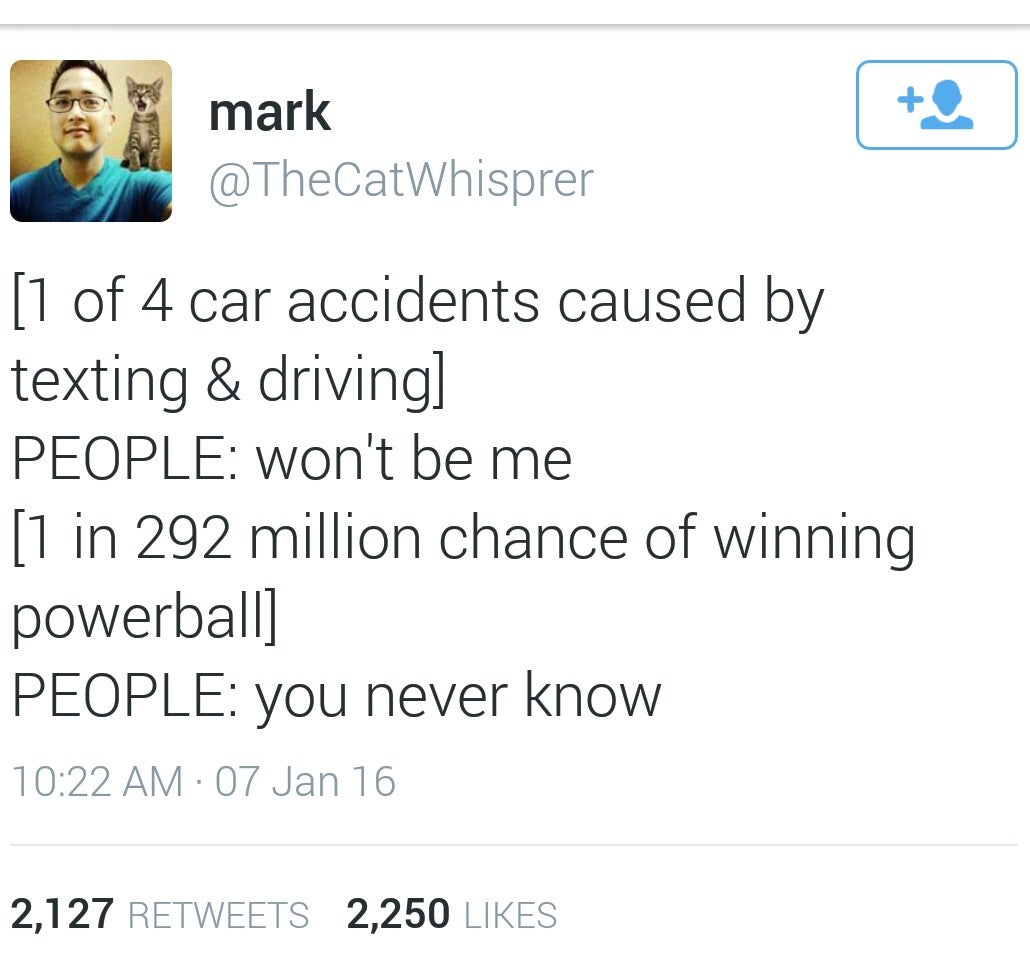 "Dwhite - Powered by Caffeine, Daft Punk, and Corgis" (Dwhite95)
"Dwhite - Powered by Caffeine, Daft Punk, and Corgis" (Dwhite95)
01/13/2016 at 17:50 ē Filed to: None
 0
0
 12
12
 "Dwhite - Powered by Caffeine, Daft Punk, and Corgis" (Dwhite95)
"Dwhite - Powered by Caffeine, Daft Punk, and Corgis" (Dwhite95)
01/13/2016 at 17:50 ē Filed to: None |  0 0
|  12 12 |
Acording to 538 there is upwards of a 97% chance that at least one person has a winning ticket. They also estimate that just over 1 billion tickets are going to be sold by the drawing... !!!error: Indecipherable SUB-paragraph formatting!!!
Also, that winner is clearly that going to be me.

 Matt Nichelson
> Dwhite - Powered by Caffeine, Daft Punk, and Corgis
Matt Nichelson
> Dwhite - Powered by Caffeine, Daft Punk, and Corgis
01/13/2016 at 17:53 |
|
And that means clearly you are buying us all new Ferraris when you do, right? Right?
 MonkeePuzzle
> Dwhite - Powered by Caffeine, Daft Punk, and Corgis
MonkeePuzzle
> Dwhite - Powered by Caffeine, Daft Punk, and Corgis
01/13/2016 at 17:56 |
|

 K-Roll-PorscheTamer
> Dwhite - Powered by Caffeine, Daft Punk, and Corgis
K-Roll-PorscheTamer
> Dwhite - Powered by Caffeine, Daft Punk, and Corgis
01/13/2016 at 18:01 |
|
Did you buy tickets? My mother gave me money to buy 3.
 Ross Kraz
> Dwhite - Powered by Caffeine, Daft Punk, and Corgis
Ross Kraz
> Dwhite - Powered by Caffeine, Daft Punk, and Corgis
01/13/2016 at 18:03 |
|
Can someone explain this to me?
An MSN article said that thereís a 15% chance that nobody will pick the right numbers. But the odds are 1:292,201,338. Which means that if every random combination of numbers is picked, and if over a billion tickets are sold, there would be at least 3-4 winners. But...thatís not the right logic in statistics terms apparently.
Statistics confuses me.
 Dwhite - Powered by Caffeine, Daft Punk, and Corgis
> Ross Kraz
Dwhite - Powered by Caffeine, Daft Punk, and Corgis
> Ross Kraz
01/13/2016 at 18:07 |
|
Personally, Iíd trust 538 here. Theyíre known for putting some real quality articles out there.
 Dwhite - Powered by Caffeine, Daft Punk, and Corgis
> K-Roll-PorscheTamer
Dwhite - Powered by Caffeine, Daft Punk, and Corgis
> K-Roll-PorscheTamer
01/13/2016 at 18:07 |
|
Yeah, its worth the cost to day dream all day.
 Dwhite - Powered by Caffeine, Daft Punk, and Corgis
> MonkeePuzzle
Dwhite - Powered by Caffeine, Daft Punk, and Corgis
> MonkeePuzzle
01/13/2016 at 18:08 |
|
Is it really 1-4 now? Huh...
 Jayhawk Jake
> Ross Kraz
Jayhawk Jake
> Ross Kraz
01/13/2016 at 18:14 |
|
You arenít accounting for overlapping numbers.
Not every ticket is unique. So itís possible that there are over a billion tickets but not every unique ticket combination.
 Scott
> Ross Kraz
Scott
> Ross Kraz
01/13/2016 at 18:15 |
|
Except not every possible combination is necessarily picked. Also you factor in that previous drawing did not have winners so the odds increase that eventually there will be a winner. Yes if every single possibility was picked it would be guaranteed that someone is a winner, but since many combinations go unpicked, and many choices are picked by multiple people they have to say what are the odds that it is a picked combination. For example many people pick 1, 2, 3, 4, 5, 6 as their numbers because statistically it has as much odds as any other set of numbers. Yet its very unlikely anyone picks 23, 24, 25, 26, 27, 28.
 Sarcun
> Ross Kraz
Sarcun
> Ross Kraz
01/13/2016 at 18:17 |
|
Iíd assume: (292,201,337/292,201,338)^(1,008,000,000) which is about 3.2%. This is the chance of every person not having a winning ticket. [Note that this assume a very high level of independence and some extrapolation.].
 Saracen
> Dwhite - Powered by Caffeine, Daft Punk, and Corgis
Saracen
> Dwhite - Powered by Caffeine, Daft Punk, and Corgis
01/13/2016 at 19:02 |
|
Yep. 538 knows their shit...pretty sure everyone that works there is a genius statistician.
 traderQAMobileTestAutomationMobileBoostOn
> MonkeePuzzle
traderQAMobileTestAutomationMobileBoostOn
> MonkeePuzzle
01/13/2016 at 19:56 |
|
Some real optimism in both cases there.